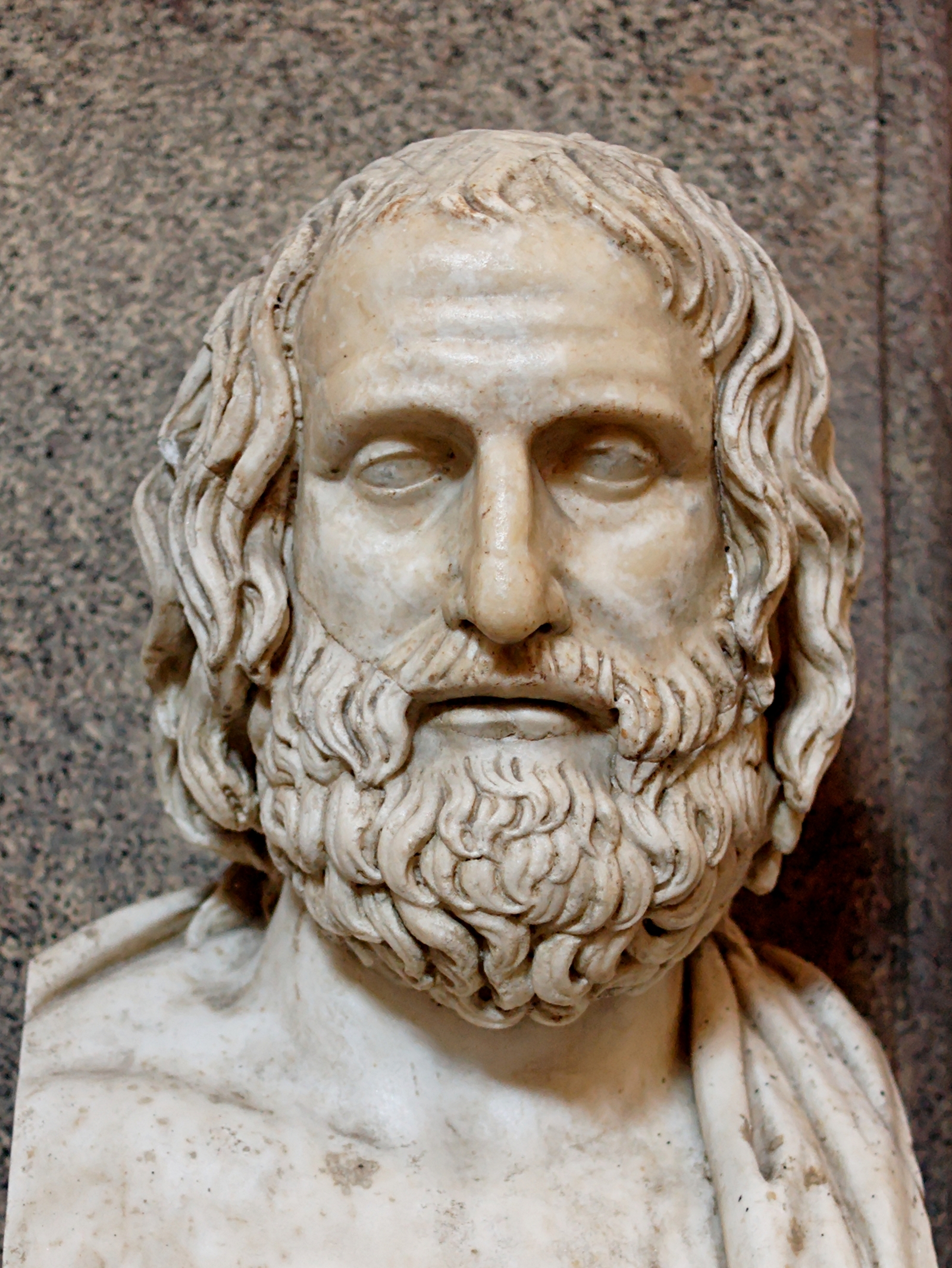Euripidés Berühmte Zitate
Euripidés Zitate und Sprüche
„Die Zeit entlarvt den Bösen.“
Hippolyt 428 / Phädra
Original altgriech.: "Κακοὺς δὲ θνητῶν ἐξέφην' ὅταν τύχῃ."
„Du zählst im Elend keinen Freund.“
Elektra 1131 / Elektra
Original altgriech.: "πένητας οὐδεὶς βούλεται κτᾶσθαι φίλους."
„Ein guter Mann wird stets das Bessre wählen.“
Iphigenie in Aulis, 502f / Menelaus
Original altgriech.: "ἀνδρὸς οὐ κακοῦ τρόποι // τοιοίδε, χρῆσθαι τοῖσι βελτίστοις ἀεί.."
„Ein vorsichtiger ist besser als ein waghalsiger Heerführer.“
Die Phönizierinnen 599 / Polyneikes
Original altgriech.: "ἀσφαλὴς γάρ ἐστ' ἀμείνων ἢ θρασὺς στρατηλάτης."
„Ob einem reiche Totengabe wird zuteil, das ist nur eitle Prahlerei der Lebenden.“
Die Troerinnen 1249f / Hekuba
Original altgriech.: "εἰ πλουσίων τις τεύξεται κτερισμάτων· // κενὸν δὲ γαύρωμ´ ἐστὶ τῶν ζώντων τόδε."
„Sei bei mir, in Maßen zwar, doch verlasse mich nicht.“
über den Wein, gemäß Plutarch Moralia, Vorschriften zur Gesundheit, Kapitel 19
Original altgriech.: "εἴης μοι, μέτριος δέ πως // εἴης μηδ´ ἀπολείποις."
Euripidés: Zitate auf Englisch
“Dishonour will not trouble me, once I am dead.”
Quelle: Alcestis (438 BC), l. 726
“Nothing has more strength than dire necessity.”
Helen (412 BC), as translated by Richmond Lattimore
“Twas but my tongue, 'twas not my soul that swore.”
Variant translation by David Grene:
My tongue swore, but my mind was still unpledged.
Quelle: Hippolytus (428 BC), l. 612, as translated by Gilbert Murray (1954)
“A bad beginning makes a bad ending.”
Melanippe the Wise (fragment)
Variante: A bad ending follows a bad beginning.
“Ares (The God of War) hates those who hesitate.”
Heraclidæ (c 428 BC) line 722
Alternate translation : Ares hates the sluggard most of all. (translated by David Kovacs)
Sisyphus, as translated by R. G. Bury, and revised by J. Garrett http://www.wku.edu/~jan.garrett/302/critias.htm
Variant translation: He was a wise man who originated the idea of God.
“A coward turns away, but a brave man's choice is danger.”
Iphigenia in Tauris (c. 412 BC) l. 114
Bacchae l. 472, as translated by Colin Teevan (2002)
“Circumstances rule men and not men circumstances.”
Herodotus, Book 7, Ch. 49; Misattributed to Euripedes in "The Imperial Four" by Professor Creasy in Bentley's Miscellany Vol. 33 (January 1853), p. 22
Variant translation: Circumstances rule men; men do not rule circumstances.
Misattributed
“O lady, nobility is thine, and thy form is the reflection of thy nature!”
Ion (c. 421-408 BC) l. 238
ἁπλοῦς ὁ μῦθος τῆς ἀληθείας ἔφυ,
κοὐ ποικίλων δεῖ τἄνδιχ᾽ ἑρμηνευμάτων
Quelle: The Phoenician Women, Lines 469–470
“Of troubles none is greater than to be robbed of one’s native land.”
Variant translation (by Paul Roche): For nothing is like the sorrow or supersedes the sadness of losing your native land.
Quelle: Medea (431 BC), Line 653 (translated by David Kovacs: Perseus Digital Library)
“I sacrifice to no god save myself — And to my belly, greatest of deities.”
The Cyclops (c.424-23 BC)
“Good slaves [are affected by] the adversities of their masters”
Bacchæ l. 1028
the original sentence does not contain any verb
“Chance fights ever on the side of the prudent.”
Pirithous
Variante: Fortune truly helps those who are of good judgement.
“Never say that marriage has more of joy than pain.”
Quelle: Alcestis (438 BC), l. 238
“Today's today. Tomorrow we may be
ourselves gone down the drain of Eternity.”
Quelle: Alcestis (438 BC), l. 788

